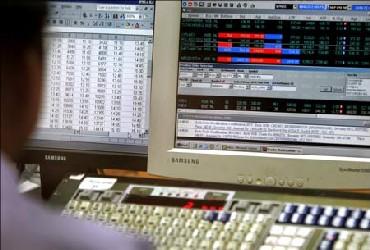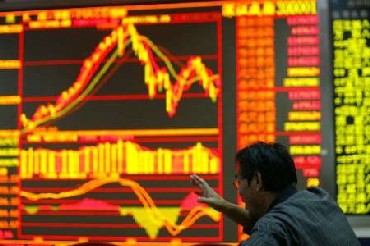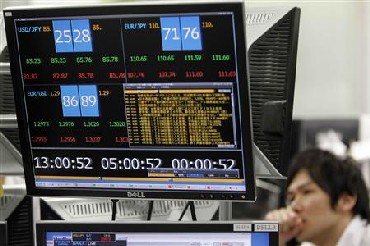N Sundaresha Subramanian in Mumbai
Since its low on July 26, the US dollar index has gained a little over eight per cent. In the same period, the Bombay Stock Exchange Sensitive Index, or Sensex, has lost 12.4 per cent, establishing a negative correlation of about 1.5 times.
This means for every percentage point increase in the dollar index, the Sensex loses 1.5 percentage points.
This inverse relationship, which measures the sensitivity of Indian equities to the movement of the US dollar, is at its highest in 15 years, according to experts.
Sailav Kaji, chief strategist, Padmakshi Financial services, said, "The currency correlation has increased because of the events in Greece. The crisis in the Eurozone has led to the dollar strengthening across all South Asian currencies. When this happens, equity investors look to hedge their exposure or sell-off, naturally driving up the correlation."
...
Why Indian stocks are sensitive to dollar movement
Photographs: Reuters
A higher sensitivity accelerates the speed and quantum of a equity sell-offs in the event of a flight for safety following major events like the collapse of Lehman Brothers in 2008. This is because a stronger dollar adds to the losses of the equity investors, creating a vicious cycle.
The dollar's strength, or conversely the rupee's weakness, has a cascading effect on equity returns of investors who buy stocks with their dollars.
In the absence of full convertibility, foreign investors have to convert their dollars into rupees to buy stocks here and do the reverse while selling.
So, dollar investors see the rupees they get selling their stocks fetch lesser dollars in exchange, hitting further to their equity losses.
...
Why Indian stocks are sensitive to dollar movement
A rising dollar has hurt most Asian markets, but countries holding larger forex reserves (as a ratio of their GDP), like Malaysia, the Philippines and Taiwan, were relatively better off, say analysts.
"Countries with lower reserves tend to exhibit a higher negative beta to the US dollar index. This phenomenon was also observed recently when the US dollar witnessed a sharp up-move against many EM currencies, quickly followed by significant sell-offs in the respective EM equity markets (US$ terms)," a Morgan Stanley report said.
According to the Morgan Stanely report, in 1995, before foreign institutional investment (FII) flows started in a big way, Indian equities had a positive correlation of 0.18 with the dollar movement.
...
Why Indian stocks are sensitive to dollar movement
Photographs: Reuters
This means if dollar index rose by one per cent, Indian stocks also rose, but to an extent of 0.18 per cent. However, over the years, the influence of FIIs in Indian markets has grown manifold, leading to a larger interplay of forex and equity markets.
As more foreign money hit Indian shores, the relationship reversed and by 2005, a percentage point rise in dollar led to a quarter percentage fall in stocks and vice versa.
Experts feel the current spike in the dollar sensitivity is a short-term phenomenon driven by global events.
Not many investors who are flying for dollar now have a long-term positive view on the dollar, given the state of the US economy, they reason. Increasing worries about the crisis in Europe has primarily led to a heavy demand for dollars.
...
Why Indian stocks are sensitive to dollar movement
Photographs: Kim Kyung-Hoon/Reuters
"European banks are finding it difficult to fund and get dollar assets. American institutions have stopped lending to them. This has led to hoarding of dollars. People are looking to sell equity assets and hold dollars. This is what is driving the Indian currency down," said Jayesh Gandhi, executive director, Morgan Stanley Investment Management.
"Greece and Europe need to be fixed. It has now become more a political decision than a decision by central bankers," he added.
Sailav Kaji of Padmakshi said once the global events played out and stability returned, the currency correlation with the Indian markets would revert back to more reasonable levels of 0.65 to 0.75. "this could happen in the next couple of months."







article